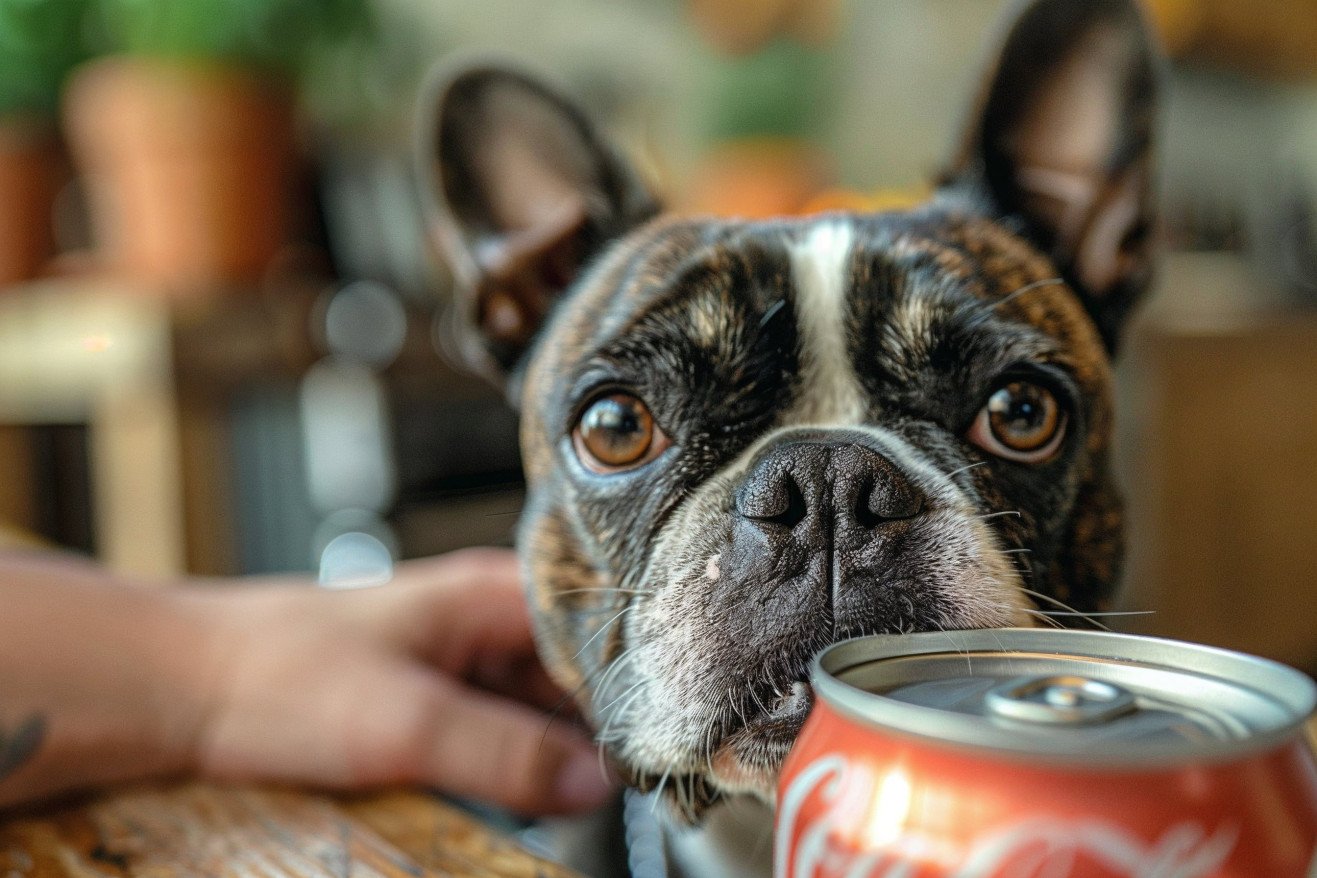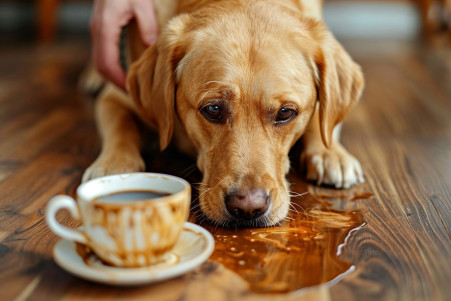Can Dogs Have Soda? A Look at Carbonated Beverages for Dogs
22 March 2024 • Updated 21 March 2024

If you're worried about your dog's well-being and are considering letting them have a sip of your favorite carbonated beverage, you should know that dogs should not have soda or any other caffeinated or sweetened beverage. These drinks can cause a variety of health problems, including obesity, diabetes, and other issues. In addition, the carbonation and acidity in soda can cause digestive problems for dogs. Instead, you should make sure your dog has access to fresh, clean water to make sure they stay healthy and hydrated.
Below, we'll go into detail about the risks of giving dogs soda and other human sodas, including colas, root beer, energy drinks, and more, based on information from veterinarians and pet nutritionists. We'll look at the ingredients and effects of these drinks to help you understand the potential risks to your dog. We'll also talk about some healthier alternatives that are safe for dogs and can help them quench their thirst without causing harm.
Can dogs drink soda?
Soda Ingredients Are Harmful to Dogs
The sugar in soda is a major concern for dogs, who can suffer from obesity, diabetes, and other health problems if they consume too much sugar. According to MasterClass, even a small amount of the sugar in soda can lead to negative reactions in dogs. PetHelpful explains that the sugar content can lead to hyperactivity, dehydration, and long-term issues like obesity and diabetes.
Caffeine, which is found in many sodas, is also a concern for dogs. FirstVet quotes Dr. Elisa Mazzaferro of Cornell, who explains that caffeine can lead to clinical toxicity in pets in as little as 30-60 minutes, with symptoms that include tremors, an increased heart rate, and seizures. DogTime adds that hyperactivity, restlessness, and vomiting are also signs of caffeine toxicity in dogs.
Artificial sweeteners are also a concern, especially xylitol, which can lead to a sudden drop in blood sugar and liver failure, according to PetHelpful. In addition, other ingredients like food dyes can be hard for dogs to digest, and carbonation can lead to an upset stomach, according to DogTime.
In the end, soda is not a good source of nutrition for dogs. At best, it contains unhealthy ingredients, and at worst, it contains ingredients that can be toxic to dogs, even in small amounts. For this reason, dogs should not be given soda under any circumstances.
Symptoms of Soda Toxicity in Dogs and What to Do
If your dog has ingested soda, it is important to be aware of the symptoms of toxicity and to get your pet to the vet right away. According to Sierra Delta, common symptoms of soda toxicity in dogs include restlessness, vomiting, diarrhea, tremors, and abnormal heart rhythms. Wag! also notes that soda can lead to severe dehydration, a sugar high, and a life-threatening drop in blood sugar in dogs.
Because soda toxicity can be fatal, it is important to act quickly. Pet Poison Helpline recommends calling your vet immediately if your dog has ingested a large amount of soda. Depending on the severity of the case, your vet may recommend treatments such as inducing vomiting, giving activated charcoal, providing IV fluids, and prescribing medications to help alleviate symptoms.
To avoid soda toxicity, Sierra Delta recommends training your dog not to beg, crate-training, and keeping soda out of your dog's reach. It is also important to make sure that any leftover soda is disposed of properly. Finally, make sure to keep a close eye on your dog and take them to the vet if they have ingested even a small amount of soda.
Potential Long-Term Health Risks of Dogs Drinking Soda
The long-term health risks of dogs drinking soda regularly can be quite serious. For example, as Rallie explains, the high sugar content in soda can lead to obesity and diabetes in dogs just like it can in humans. In fact, dogs that consume too much sugar are at risk of developing diabetes that's similar to the diabetes that affects humans, which can lead to organ failure, blindness, and other serious health problems.
In addition to the potential risks of sugar, Doggyzine.com points out that the caffeine in soda can lead to long-term problems, including hyperactivity, restlessness, and, in some cases, seizures. Meanwhile, as Camp Canine Florida explains, the artificial sweeteners in diet sodas can cause blood sugar levels to drop to dangerous levels and can even result in liver failure.
Meanwhile, the sugar, caffeine, and other ingredients in soda can lead to dehydration, dental issues, and chronic digestive problems in dogs over time. Dogs need to maintain a balanced, nutritious diet, and introducing excessive amounts of these potentially harmful ingredients can have serious long-term consequences.
In the end, the potential dangers of soda for dogs far outweigh any possible benefits. As is often the case with humans, moderation is important, but dogs are best off avoiding soda altogether to protect their long-term health and well-being. As we'll discuss in the next section, there are plenty of other drink options that are much safer and healthier for our furry friends.
Other Healthy and Safe Drinks for Dogs
While water is the most important beverage for dogs, as it is for humans, it's important to remember that water is a vital part of every aspect of a dog's physical well-being, and dehydration can be just as problematic as drinking the wrong things.
That said, there are some safe options that can be given to dogs as a treat or to mix things up a bit. According to Dogster, some of the best options include unsweetened nut milks, coconut water, and a small amount of pure fruit juice. Hepper also lists bone broth and hydrogen-enhanced water as potential options for dogs.
On the other hand, it's important to stay away from drinks that contain caffeine, alcohol, chocolate, grapes, or artificial sweeteners, as these can be toxic, according to Canine Journal. It's also a good idea to check with a vet before giving a dog any new drink, as individual dietary needs and sensitivities can vary.
Conclusion: Don't Let Your Dog Drink Soda
Soda is dangerous for dogs due to its high sugar content, caffeine, and other potentially toxic ingredients. The risks of soda consumption for dogs include the potential for obesity, diabetes, excitability, seizures, and other life-threatening health problems. If a dog does consume soda, it's important to get them to the vet immediately, as the consequences can be dire.
Instead, dogs should be given fresh, clean water as their main source of hydration. While it's OK to offer dogs the occasional safe treat, such as unsweetened nut milks or a small amount of fruit juice, anything that contains caffeine, alcohol, or artificial sweeteners should be avoided at all costs. It's up to dog owners to ensure that their pets eat a healthy, well-balanced diet that's free from potentially toxic human foods and beverages.
Soda is not safe for dogs and can cause a number of health problems, some of which can be life-threatening. By learning about the risks and making sure to prioritize safe, dog-appropriate hydration, pet parents can help ensure that their dogs live long, healthy, and happy lives.


